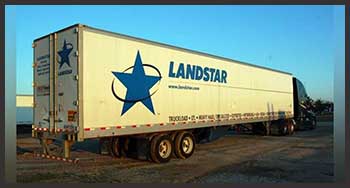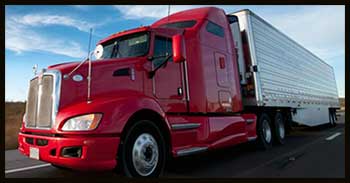For owner-operators looking to lease onto a motor carrier, two of the biggest names in the industry are Landstar Inway and Ranger. Both offer the freedom and potential profit of running your own trucking business with the support and stability of an established carrier.
However, there are some key differences between the two that drivers should understand before signing on. This detailed comparison examines the pros, cons, and key features of Landstar Inway and Ranger to help owner-ops choose the best fit.
A Brief Comparison Table
| Features | Landstar Inway | Ranger Truckload |
| Pay Structure | Percentage of load revenue, approx 80/20 split | Percentage + fuel surcharges and bonuses |
| Trailer Leasing | Owner operator must lease/purchase | Provided by Ranger |
| Operating Authority | Must have own DOT/MC authority | Handled by Ranger |
| Insurance Requirements | $1M liability minimum | $1M liability, $10k cargo, $2.5k deductible |
| Contract Length | None | 12 month minimum |
| Dispatch | No forced loads, choose own freight | No forced loads, choose own freight |
| Service Area | All of North America | Primarily Midwest and South |
| Driver Experience | Prefers 2+ years business management | Prefers 1+ years CDL experience |
| Equipment Options | All types – vans, flats, hotshot, intermodal | Mostly refrigerated vans only |
Overview Of Landstar Inway
Landstar Inway is a subsidiary of Landstar System, Inc., one of the largest transportation logistics companies in North America. Landstar Inway focuses specifically on providing truckload, less-than-truckload, and intermodal services.
As of 2022, Landstar has over 1800 employees and more than 1900 leased owner-operators across the United States, Canada, and Mexico.

Pros of Leasing to Landstar Inway
- Large established company with plenty of freight volume. Landstar moves over 130,000 loads per week on average.
- No forced dispatch. Drivers choose their own loads.
- Paid percentage of each load, not per mile. Earnings potential is higher.
- Access to drop trailer and relay options. More flexibility for drivers.
- Wide range of trailer options from vans to flatbeds. Good for specialized hauling.
- Free training programs and support services for new operators.
Cons of Leasing to Landstar Inway
- Commission pay structure means some financial instability.
- Owner-ops pay their own operating costs like fuel, maintenance, etc.
- Safety bonus structure penalizes drivers for citations and accidents.
- Can be difficult to get started without solid credit history and business experience.
- Requires your own operating authority.
Overview Of Ranger Truckload, Inc
Ranger Truckload, Inc. is a refrigerated flatbed, van, and intermodal carrier that began in 1999. They operate primarily east of the Rocky Mountains in the lower 48 states.
Ranger focuses on flexible personalized service aimed at owner-operators’ needs.

Pros of Leasing to Ranger
- Smaller company with more personal driver relationships.
- Percentage pay plus fuel surcharge and bonuses. Earnings can be very lucrative.
- No forced dispatch or mandated load minimums. Flexibility for drivers.
- Provides trailers as part of lease. Saves upfront costs.
- Good home time and family-oriented approach.
- Handles licensing, permitting, insurance for drivers. Lowers business overhead.
Cons of Leasing to Ranger
- Limited trailer options – mostly refrigerated vans. Not ideal for specialized hauling.
- Safety and compliance bonuses have strict criteria. Hard to earn maximum payouts.
- Limited freight lanes concentrated in the Midwest and South. Restricted route options.
- May have less consistent freight during seasonal slowdowns.
- Requires 1+ years of CDL driving experience. Not for brand new operators.
Also Read: Comparison Between Indiana Transport And Horizon Transport.
Key Feature Comparison
When comparing the nitty-gritty details, there are some clear distinctions between leasing on with Landstar or Ranger. Here is an overview of some of the key features for each company:
Business Experience
- Landstar prefers 2+ years of business management expertise for new operators. Ranger focuses more on driving experience.
Trailer Leasing
- Ranger provides trailers. Landstar requires you to lease or purchase your own.
Operating Authority
- You need your own DOT and MC authority numbers for Landstar. Ranger handles licensing and authority.
Insurance Requirements
- Both require $1 million liability coverage. Ranger also needs $10,000 cargo and $2500 deductible collision/comprehensive.
Contract Length
- Ranger asks for a 12-month commitment. Landstar has no minimum contract.
Dispatch Method
- Neither forces loads. Both allow drivers to select available freight using an online system.
Service Area
- Landstar loads are available across the continent. Ranger has a smaller service footprint concentrated in the Midwest and South.
Pay and Settlement
- Both pay a percentage of the load revenue. Ranger also provides fuel surcharges and bonuses.
- Ranger settles on a weekly basis. Landstar is pay-per-load with weekly direct deposit option.
Also Read: Comparison Between Schneider And Werner.
Pros And Cons Compared
Looking at the overall advantages and disadvantages side-by-side, some key themes emerge:
Pros
- Higher Earning Potential: Ranger’s bonuses on top of percentage pay often works out to higher per-mile earnings. Landstar offers better revenue on specialized, high-value loads.
- Flexibility: Both allow you to operate independently and decline loads as desired. Landstar provides more route diversity while Ranger enables more home time.
- Experience Requirements: Ranger is more feasible for newer CDL drivers. Landstar provides good programs but prefers business management experience.
Cons
- Business Costs: Landstar owner-ops pay for licensing, insurance, etc, while Ranger covers more of these overhead costs.
- Contract Commitment: Ranger’s 12-month minimum could reduce flexibility, whereas Landstar has no contractual obligation.
- Equipment Options: Ranger only utilizes refrigerated vans. Landstar offers more trailer diversity for specific cargo needs.
Also watch this video of Landstar!
Frequently Asked Questions (FAQ)
No, Ranger Truckload, Inc. is a completely separate, privately-owned company not affiliated with Landstar System, Inc. The name similarity is just a coincidence.
Landstar Inway takes a 20% cut as a brokerage fee from each load, and the remaining 80% goes to the owner-operator. There are no other percentages or commissions taken.
Landstar prefers 2+ years of trucking business operation and management expertise. However, they also offer training programs for candidates with less experience who they think show promise.
Yes, Landstar Inway works with owner-operators hauling hotshot, expedited loads using straight trucks and tractor trailers. The hotshot division offers slightly different pay and commission structures than the standard fleet.
Also Read: Comparison Between Mercer And Landstar.
Conclusion
- Landstar Inway and Ranger Truckload both offer viable options for owner-ops seeking the freedom of operating their own business.
- Choose Landstar for diversity in freight types, minimal contractual obligations, and high earning potential on specialized hauls.
- Choose Ranger for refrigerated van hauling, lower overhead costs, better home time, and strong per-mile percentage pay.
- Do your due diligence on the dispatch methods, pay structures, trailer options, contract terms, and working culture to determine the best carrier fit.
Both Landstar and Ranger have reputations for being driver-focused carriers that offer the support and infrastructure of big transportation companies while allowing the flexibility and profit potential of being your own boss.
Evaluating the pros, cons and differences between their lease programs will position you to make the right choice for your trucking business.
